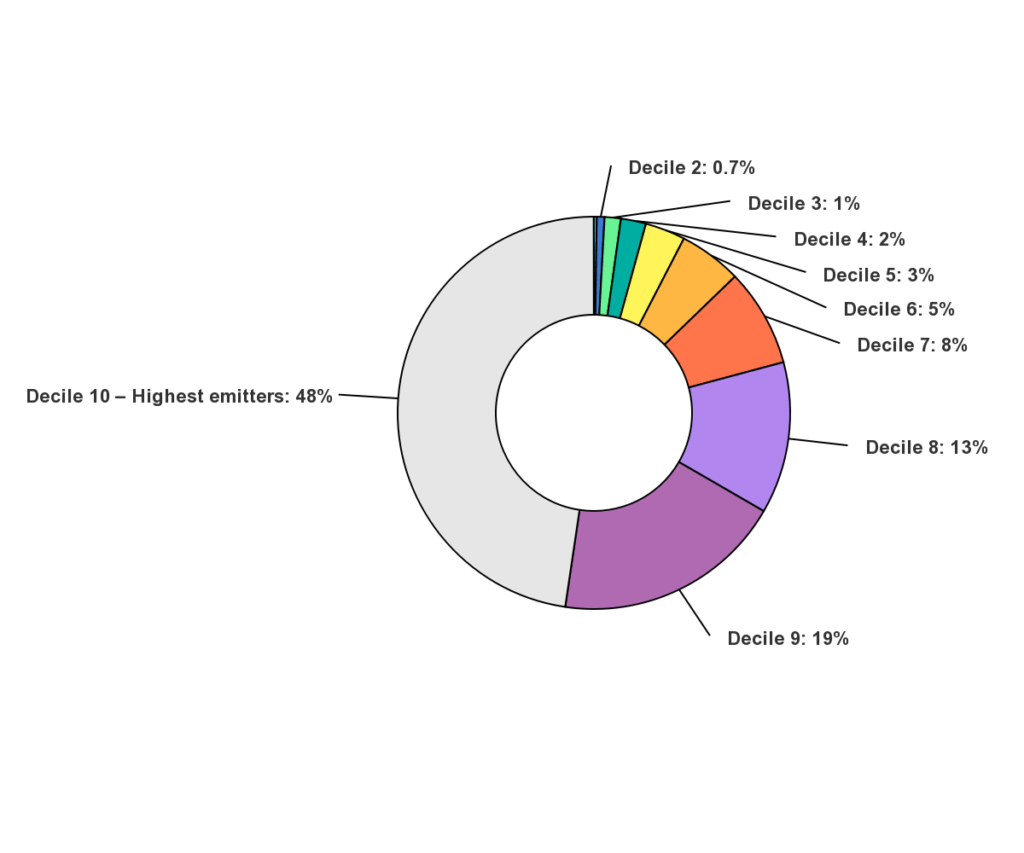In a world grappling with an imminent climate crisis, where the very fate of our planet hangs in the balance, the dialogue of inequality comes to the fore. The intricate interplay between economic disparity and climate change is a crisis that demands immediate attention. This critical linkage was meticulously analyzed and published by Oxfam aptly titled “Carbon Inequality.” Concurrently, the insights from Chancel and Piketty” by Lucas Chancel and Thomas Piketty, published by IEA, added depth to the discourse.
The findings of “Carbon Inequality” underscore the urgency of climate justice, emphasizing that climate change is not merely an environmental challenge but a social and economic crisis. If the top 10% of emitters globally maintain their current emissions levels from now onwards, they alone will exceed the remaining carbon budget in the IEA’s Net Zero Emissions by 2050 Scenario by the year 2046. In other words, substantial and rapid action by the richest 10% is essential to decarbonize fast enough to keep 1.5°C warming in sight. This startling revelation from the Oxfam briefing serves as a clarion call, highlighting the pivotal role of the wealthiest in mitigating the climate crisis.
Oxfam’s analysis reveals a staggering disparity in global carbon emissions related to lifestyle consumption. The report states that the poorest half of the global population, encompassing around 3.5 billion individuals, accounts for a mere 10% of the total global emissions attributed to individual consumption. In contrast, approximately 50% of these emissions can be attributed to the richest 10% of people worldwide, whose carbon footprints are, on average, 11 times higher than the poorest half. The wealthiest 1% could have a carbon footprint as much as 175 times that of the poorest 10%.
One crucial aspect highlighted in the briefing is that the lifestyle consumption emissions of even rapidly growing economies like China and India, often viewed as major contributors to emissions, are not as significant when compared to their counterparts in affluent OECD countries. The research underscores the necessity of equitable distribution of responsibilities and actions across the global population. Moreover, Oxfam’s briefing draws attention to the fact that the majority of the world’s wealthiest 10% high emitters predominantly reside in OECD countries, emphasizing the need for developed nations to lead the way in emissions reduction and sustainable practices.
Complementing Insights from “Carbon and Inequality” by Chancel and Piketty
The paper authored by Lucas Chancel and Thomas Piketty resonates with Oxfam’s message of addressing inequality in emissions. Their research converges with the call for equitable climate action by highlighting the need for progressive taxation on carbon emissions and advocating for a low-carbon developmental space for the world’s disadvantaged.

Image Source: IEA, Global energy-related CO2 emissions by decile, 2021, IEA, Paris https://www.iea.org/data-and-statistics/charts/global-energy-related-co2-emissions-by-decile-2021, IEA. Licence: CC BY 4.0
Chancel and Piketty’s work emphasizes that individual carbon emissions are significantly unequal across the world, pointing towards a disproportionate distribution of responsibility for climate change. The paper aligns with Oxfam’s perspective on addressing within-country carbon inequalities and climate change impacts, reinforcing the urgent need to prioritize the most vulnerable in climate agreements.
Impediments to Climate Action: The Role of Vested Interests
Both Oxfam’s briefing and the insights from Chancel and Piketty’s paper shed light on the role of vested interests, particularly within the fossil fuel industry, in obstructing comprehensive climate action. The surge in billionaires associated with fossil fuel activities raises concerns about their influence and the challenge they pose to effective climate policies.
The briefing underscores that a weak agreement in addressing climate change is not in the interests of even the affluent high emitters, echoing the need to tackle vested interests and promote equitable climate policies.
Towards Equitable Climate Agreements
The revelations from Oxfam’s briefing and the research by Chancel and Piketty reiterate the pressing need for global climate agreements to address the disparities in emissions and prioritize climate action for the most vulnerable populations. The urgency lies in transitioning towards sustainable energy and implementing policies that ensure an equitable distribution of benefits and responsibilities in the fight against climate change.
The wealthiest often pioneer the adoption of energy-efficient and low-emissions solutions, given their significant financial capacity. For instance, a substantial portion of electric vehicles was initially purchased by high-income individuals. However, as the availability of diverse price point models increased, electric vehicles are becoming more ubiquitous.
As the world grapples with the climate crisis, it becomes imperative to prioritize those least responsible for and most affected by climate change. Bridging the gap of inequality in carbon emissions is not only a moral obligation but a strategic imperative to build a sustainable future for all.